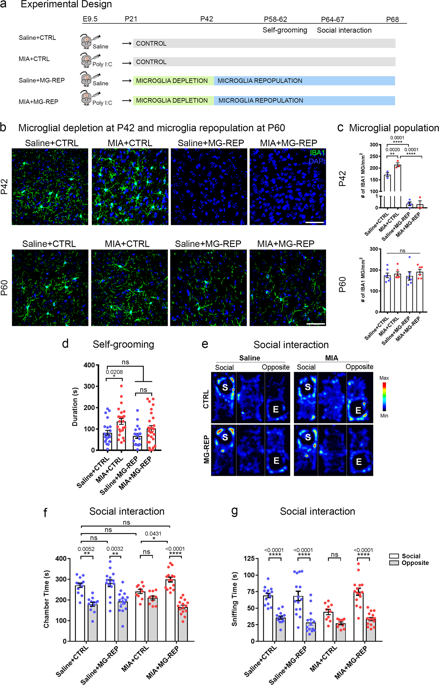当前位置:
X-MOL 学术
›
Mol. Psychiatry
›
论文详情
Our official English website, www.x-mol.net, welcomes your
feedback! (Note: you will need to create a separate account there.)
Inhibition of colony stimulating factor 1 receptor corrects maternal inflammation-induced microglial and synaptic dysfunction and behavioral abnormalities.
Molecular Psychiatry ( IF 9.6 ) Pub Date : 2020-02-18 , DOI: 10.1038/s41380-020-0671-2 Seiko Ikezu 1 , Hana Yeh 1, 2 , Jean-Christophe Delpech 1 , Maya E Woodbury 1, 2 , Alicia A Van Enoo 1 , Zhi Ruan 1 , Sudhir Sivakumaran 3 , Yang You 1 , Carl Holland 3 , Teresa Guillamon-Vivancos 3 , Asuka Yoshii-Kitahara 1 , Mina B Botros 1 , Charlotte Madore 4 , Pin-Hao Chao 1 , Ankita Desani 1 , Solaiappan Manimaran 5 , Srinidhi Venkatesan Kalavai 1 , W Evan Johnson 5 , Oleg Butovsky 4 , Maria Medalla 3 , Jennifer I Luebke 3, 6 , Tsuneya Ikezu 1, 6, 7
Molecular Psychiatry ( IF 9.6 ) Pub Date : 2020-02-18 , DOI: 10.1038/s41380-020-0671-2 Seiko Ikezu 1 , Hana Yeh 1, 2 , Jean-Christophe Delpech 1 , Maya E Woodbury 1, 2 , Alicia A Van Enoo 1 , Zhi Ruan 1 , Sudhir Sivakumaran 3 , Yang You 1 , Carl Holland 3 , Teresa Guillamon-Vivancos 3 , Asuka Yoshii-Kitahara 1 , Mina B Botros 1 , Charlotte Madore 4 , Pin-Hao Chao 1 , Ankita Desani 1 , Solaiappan Manimaran 5 , Srinidhi Venkatesan Kalavai 1 , W Evan Johnson 5 , Oleg Butovsky 4 , Maria Medalla 3 , Jennifer I Luebke 3, 6 , Tsuneya Ikezu 1, 6, 7
Affiliation

|
Maternal immune activation (MIA) disrupts the central innate immune system during a critical neurodevelopmental period. Microglia are primary innate immune cells in the brain although their direct influence on the MIA phenotype is largely unknown. Here we show that MIA alters microglial gene expression with upregulation of cellular protrusion/neuritogenic pathways, concurrently causing repetitive behavior, social deficits, and synaptic dysfunction to layer V intrinsically bursting pyramidal neurons in the prefrontal cortex of mice. MIA increases plastic dendritic spines of the intrinsically bursting neurons and their interaction with hyper-ramified microglia. Treating MIA offspring by colony stimulating factor 1 receptor inhibitors induces depletion and repopulation of microglia, and corrects protein expression of the newly identified MIA-associated neuritogenic molecules in microglia, which coalesces with correction of MIA-associated synaptic, neurophysiological, and behavioral abnormalities. Our study demonstrates that maternal immune insults perturb microglial phenotypes and influence neuronal functions throughout adulthood, and reveals a potent effect of colony stimulating factor 1 receptor inhibitors on the correction of MIA-associated microglial, synaptic, and neurobehavioral dysfunctions.
中文翻译:

抑制集落刺激因子 1 受体可纠正母体炎症引起的小胶质细胞和突触功能障碍以及行为异常。
母体免疫激活(MIA)会在神经发育的关键时期破坏中枢先天免疫系统。小胶质细胞是大脑中主要的先天免疫细胞,尽管它们对 MIA 表型的直接影响在很大程度上尚不清楚。在这里,我们表明,MIA 通过上调细胞突起/神经元通路来改变小胶质细胞基因表达,同时导致小鼠前额皮质中 V 层本质上爆发的锥体神经元的重复行为、社交缺陷和突触功能障碍。 MIA 增加了本质上爆发的神经元的塑料树突棘及其与超分支小胶质细胞的相互作用。用集落刺激因子 1 受体抑制剂治疗 MIA 后代会诱导小胶质细胞的消耗和重新增殖,并纠正小胶质细胞中新发现的 MIA 相关神经源性分子的蛋白质表达,这与 MIA 相关突触、神经生理学和行为异常的纠正相结合。我们的研究表明,母体免疫损伤会扰乱小胶质细胞表型并影响整个成年期的神经元功能,并揭示集落刺激因子 1 受体抑制剂对纠正 MIA 相关小胶质细胞、突触和神经行为功能障碍的有效作用。
更新日期:2020-02-18
中文翻译:

抑制集落刺激因子 1 受体可纠正母体炎症引起的小胶质细胞和突触功能障碍以及行为异常。
母体免疫激活(MIA)会在神经发育的关键时期破坏中枢先天免疫系统。小胶质细胞是大脑中主要的先天免疫细胞,尽管它们对 MIA 表型的直接影响在很大程度上尚不清楚。在这里,我们表明,MIA 通过上调细胞突起/神经元通路来改变小胶质细胞基因表达,同时导致小鼠前额皮质中 V 层本质上爆发的锥体神经元的重复行为、社交缺陷和突触功能障碍。 MIA 增加了本质上爆发的神经元的塑料树突棘及其与超分支小胶质细胞的相互作用。用集落刺激因子 1 受体抑制剂治疗 MIA 后代会诱导小胶质细胞的消耗和重新增殖,并纠正小胶质细胞中新发现的 MIA 相关神经源性分子的蛋白质表达,这与 MIA 相关突触、神经生理学和行为异常的纠正相结合。我们的研究表明,母体免疫损伤会扰乱小胶质细胞表型并影响整个成年期的神经元功能,并揭示集落刺激因子 1 受体抑制剂对纠正 MIA 相关小胶质细胞、突触和神经行为功能障碍的有效作用。











































 京公网安备 11010802027423号
京公网安备 11010802027423号